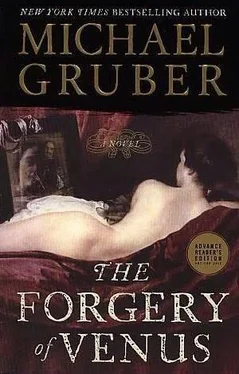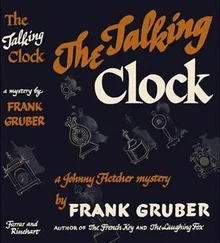After Rose was asleep I sat out on the fire escape in my parka chain-smoking and thought about being the kid Velázquez-funny what the mind constructs, another thing to talk with Shelly about. After smoking my throat raw, I went back through the window into the loft and sat at my desk and calculated my riches: twenty-five grand for the actresses plus the kill fee Condé Nast promised makes 30K, enough to pay off the really embarrassing debts, and Slotsky’s job in Italy will fix everything for the indefinite future; I’d have to stick Lotte with the whole child-care load for a while, but what else can I do? She won’t mind if there’s serious money involved, she’s got the nanny. I thought I could finally get even with the fucking medical bills and have a chance to take a breath.
Two days after that the magazine sent the kill fee: amazingly fast pay, they must feel guilty as hell. Lotte deposited the checks for the paintings, so I was flush for about twenty minutes before I started writing my own checks. The IRS ought to get nearly half of it, both for back taxes and this year’s estimated, but I couldn’t bear to pay it. Let them come and get me. Instead I got up to date with Suzanne-my more present parasite-then the rent, phone, and paying down the four credit cards, laden with medical bills, Milo’s plastic lifeline, and then around town with a stack of cash for all the people who let me have a flying hundred never expecting to see it again.
And Milo was out of the hospital, looking like old oatmeal. I spent some time with him, trying to cheer him up, and of course, he cheered me up, which is the usual case with us. He cheered up Ewa the nanny too, who has a tendency to Slavic depression at the best of times, but thank God for her anyway. Ewa from Kraków, one of the rare Polish maidens who, applying for a job as a child-care worker in America, actually obtained such a job rather than a slot in one of the slave brothels that seem to be one of the more common features of globalization.
I don’t know what it is about a sick kid that’s so hard for us moderns to deal with; it’s that core of irony that makes real grief almost impossible, you think, oh, how banal, like your life was a novel and this was a cheap literary trick, and of course we don’t really have religion anymore, or I don’t. I recall reading something that Hemingway wrote, to the effect that if your son dies you can’t read the New Yorker anymore. It’s grinding, grinding, I have these demonic thoughts like wishing he was a little piece of shit instead of the most perfect kid in the world, beautiful and talented and good, just stone decent all the way to the center of him, so it wouldn’t rip me up like it does, but maybe the parents of awful kids don’t feel that way, you see moms of serial killers weeping for their babies in the courtrooms. Where does he get it from, that cheerful grace? What is it, the booby prize from God almighty? You only get to live for twelve years, sucker, so here’s an extra helping of the Holy Spirit? Another topic I planned to discuss with Charlotte.
After I dropped the kids off in Brooklyn I took the subway up to the med school. When I checked in the secretary said Dr. Zubkoff would like to see you before you go in for your session, and pointed the way. Shelly was in his office; he motioned me to a seat and brought out a file. The usual small talk, and then he said, “Let’s talk about these past-life hallucinations you’re having.”
I said, “Yeah, if you want to call them that.”
He said, “What would you call them?” in that patient doc tone of voice.
“I relive the past,” I said. “It’s not me, as I am now, having hallucinations. I’m really in my former self, reliving a moment, whether I can recall the incident now or not. It’s a real experience.”
“I see. How is that different from a vivid dream, or a waking hallucination?”
I said, “You tell me, you’re the doctor. How do I know you’re not a hallucination? How do I know I’m not locked in a rubber room somewhere, fantasizing all this? You remember what Hume said about the limits of empirical observation.”
The doctor was not amused. He said, “Let’s just take it as given that the world is real, and external to us, and that we’re both sitting here. And I understand the vividness of the salvinorin experience. It’s been reported extensively in the literature. What I’m a little concerned about is this most recent run, where according to your report you experienced what seemed to be someone else’s past.”
It turned out this was not a normal reaction to the drug and he was hot to pump me about it. I told him what I went through last time and what Slotsky had said about the probable identity of Gito de Silva, and added that I was in the middle of the lushest creative run of my entire life.
This got him all excited and he gave me a lot of neurological information that I couldn’t follow, but the main point was that he thought that it was all a matter of various brain regions responding to the chemical stimulus and that I was constructing the past experiences as a result. It was like dreams, he said, the actual stimulus for dreaming is just random brain noise, and we interpret this noise as imagery and events.
“Yeah, that might explain me reliving my own past,” I said, “but it doesn’t deal with me reliving the past of Diego Velázquez.”
He gave me what I thought was a strange look and said, “We don’t know a lot about the subjective effects of the drug. That’s the point of the study.”
“Not much of an answer,” I said, and he sort of withdrew a little behind the professional Kevlar and said, “Well, you’re a painter, and you’re having a kind of fantasy about being a famous painter. It’s merely an enhancement of what we see every week on American Idol. ”
“You think it’s a wish-fulfillment fantasy?”
“What else could it be?” he said, and he had me there. “But let’s lower the dosage, shall we? You seem to be particularly sensitive to the drug.”
Then he had to go do something and he handed me over to Harris, who ushered me into one of the little rooms.
I lay down on the couch. She arranged her tray of little beakers, selected one, and said, “Would you mind if we put you in some light restraints? It’s for your own safety.”
I said I didn’t mind at all, and after I had chewed my wad, she placed Velcro bands around my wrists and across my chest. Then the usual floating sensation, and then I’m standing at a table grinding massicot into a fine powder using a stone mortar and pestle. The four casement windows of the room were lately barred with shutters, but now the fighting in the city has died away and there is light again to do this work. I feel the grit of the bright yellow powder with my fingers. It isn’t fine enough, so I keep grinding. The old man will not beat me if I don’t do it right, but that doesn’t matter. I must do it right, I must please him, because it’s my duty, and the honor of my family demands it. Honor is like a constant pressure, sometimes between my eyes, sometimes in my gut, like a live thing, like life itself.
The fighting was about the Immaculate Conception, which means the Blessed Virgin was born without original sin. I believe this, and it gives me an almost physical comfort even though I don’t really understand the theology. I know that some in the city deny the Immaculate Conception, and that’s why there was a small war here. I saw beaten and dead people on the street, and I wished that I was a man so that I could fight for the Blessed Virgin too and kill the bad people who deny her glory in this way. Mary’s honor and my family’s honor and my own honor are all tied together into that solid feeling in my center.
Читать дальше












